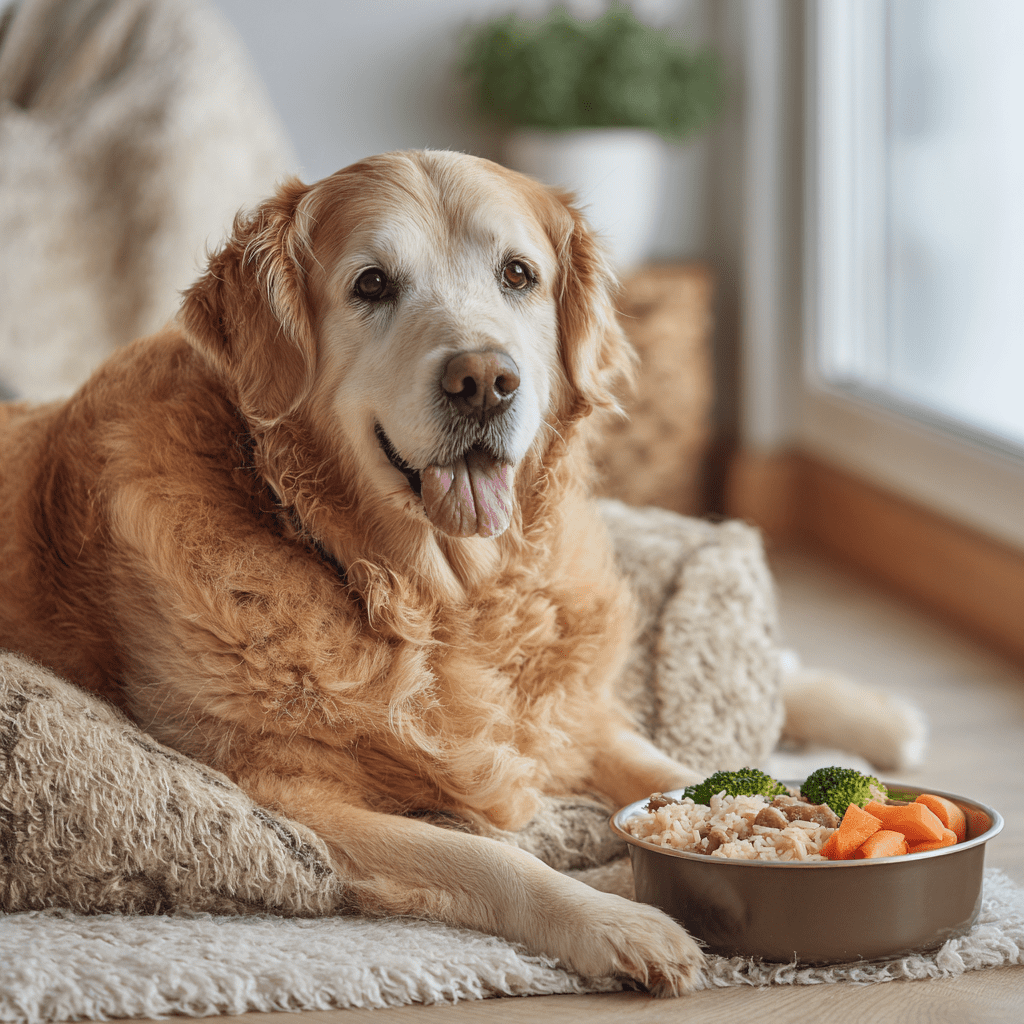Introduction
As our beloved dogs age, their needs change—especially when it comes to nutrition. Just like humans, senior dogs require special dietary adjustments to support their joints, digestion, immune system, and energy levels. What worked for them as an energetic pup or middle-aged adult may no longer be suitable in their golden years.
Feeding your senior dog a well-balanced diet tailored to their age doesn’t just add years to their life—it adds life to their years. In this guide, we’ll explore how to adjust your dog’s nutrition as they grow older, what nutrients are essential, what foods to avoid, and how to keep them thriving well into their senior stage.
When Is a Dog Considered a Senior?
The age at which a dog is considered “senior” depends on breed and size:
- Small breeds (Chihuahuas, Dachshunds): 10–12 years.
- Medium breeds (Beagles, Border Collies): 8–10 years.
- Large breeds (Golden Retrievers, German Shepherds): 7–8 years.
- Giant breeds (Great Danes, Mastiffs): 5–6 years.
This means some dogs show signs of aging sooner, while others stay spry well into double digits. Regardless of breed, paying attention to nutrition can ease the effects of aging.
Key Nutritional Needs of Senior Dogs

1. Protein for Muscle Maintenance
Older dogs tend to lose muscle mass, which can affect mobility and strength. Contrary to popular belief, senior dogs actually need more high-quality protein—not less—to maintain muscle.
- Sources: chicken, turkey, salmon, beef, lamb, and eggs.
- Look for diets with 25–30% protein for active seniors.
2. Healthy Fats for Energy and Brain Function
As metabolism slows, fat intake should be moderated to prevent weight gain. But healthy fats remain crucial.
- Omega-3 fatty acids (from fish oil and flaxseed) reduce inflammation and support brain function.
- DHA and EPA help with arthritis and cognitive decline.
3. Fiber for Digestive Health
Senior dogs often experience slower digestion. Fiber supports gut health and prevents constipation.
- Great sources: pumpkin, sweet potato, brown rice, and oats.
4. Joint-Supporting Nutrients
Arthritis and hip dysplasia are common in older dogs. Look for foods enriched with:
- Glucosamine & Chondroitin for cartilage support.
- Green-lipped mussel extract for anti-inflammatory benefits.
5. Vitamins & Minerals
- Vitamin A: Supports vision.
- Vitamin E: Antioxidant that fights cell damage.
- Vitamin C: Boosts immune defense.
- Calcium & Phosphorus: Bone strength (but in controlled amounts).
6. Lower Calories for Weight Management
Obesity in senior dogs leads to heart disease, diabetes, and joint strain. A diet slightly lower in calories helps maintain a healthy weight without compromising nutrients.
Senior Dog Diet Options
1. Commercial Senior Dog Food
- Specially formulated for aging dogs.
- Balanced protein, fiber, and fat levels.
- Fortified with glucosamine, chondroitin, and antioxidants.
2. Homemade Senior Dog Diets
- Allows you to control ingredients and quality.
- Recipes should include lean protein, complex carbs, and vegetables.
- Always consult a vet to avoid deficiencies.
3. Fresh or Lightly Cooked Diets
- Companies like Farmer’s Dog and Ollie offer fresh food tailored to senior needs.
- Easier to digest and highly palatable for picky eaters.
4. Prescription Diets
- Needed if your dog has chronic issues such as kidney disease, diabetes, or arthritis.
- Examples: Hill’s Prescription Diet, Royal Canin Veterinary Diets.
Feeding Tips for Senior Dogs
- Stick to a Routine
Older dogs thrive on consistency. Feed at the same times daily to help digestion and energy regulation. - Smaller, More Frequent Meals
Splitting meals into 2–3 smaller portions prevents overeating and supports digestion. - Moistening Food for Easier Chewing
Senior dogs may develop dental issues. Adding warm water, bone broth, or feeding wet food makes mealtime more enjoyable. - Monitor Weight Closely
Regular weigh-ins help prevent obesity or unexpected weight loss, both of which are red flags. - Encourage Hydration
Kidney issues are more common in older dogs. Provide fresh water and consider adding wet food to increase fluid intake.
Foods and Ingredients to Avoid for Senior Dogs
- High-fat treats (like bacon or cheese).
- Excessive salt (can strain kidneys and heart).
- Bones (risk of choking and digestive blockages).
- Toxic foods (onions, garlic, grapes, raisins, chocolate).
Signs Your Senior Dog May Need a Diet Change
- Stiffness or difficulty walking (need joint-supportive diet).
- Excessive weight gain or loss.
- Declining appetite or trouble chewing.
- Increased thirst (possible kidney issues).
- Digestive issues like constipation or diarrhea.
If you notice these changes, consult your veterinarian for dietary adjustments.
Supplements That Support Senior Dogs
- Fish oil (anti-inflammatory, brain health).
- Probiotics (digestive balance).
- Glucosamine & Chondroitin (joint care).
- Antioxidants (cellular protection).
Conclusion
Your senior dog has given you years of unconditional love, and now it’s your turn to return the favor with care tailored to their needs. A nutrient-rich, age-appropriate diet ensures your furry friend enjoys their golden years with energy, comfort, and joy.
By providing high-quality protein, joint-support nutrients, balanced fats, and the right calories, you can help your senior dog stay strong, sharp, and full of life well into their later years.
